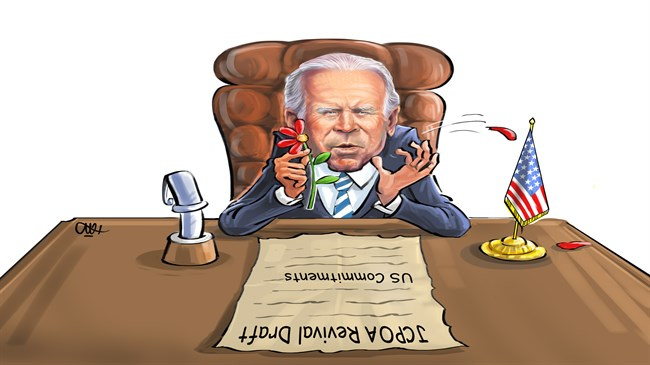Biden dragging feet on JCPOA

A new round of talks is expected to take place in the coming days, most probably in Vienna, where Iran and the United States will lock horns indirectly again for a deal to revive the 2015 nuclear deal, known as the JCPOA.
Josep Borrell, the European Union’s foreign policy chief, wrote an opinion in the Financial Times on Tuesday in which he announced that the EU, as the coordinator of the talks, had put forward a new “text” to bring back the tattered accord to life. Although the new package is not “perfect” as Borrell penned, it “represents the best possible deal that… addresses all essential elements and includes hard-won compromises by all sides”.
The top EU diplomat noted that the deal on the table is “better protected from potential unilateral moves” as it reflects Washington’s “assurances”.
Some analysts believe that Borrell’s warning about a “dangerous nuclear crisis” if his deal is rejected means that his proposed text is in fact an ultimatum or the last chance for Iran and the U.S. to resurrect the JCPOA.
There have been no words from European, American or Iranian officials about the details of the latest proposal. However, Tehran and Washington cautiously welcomed the package in principle.
Ned Price, the spokesman of U.S. State Department, said Washington would look into it and Iran’s chief negotiator Ali Baqeri Kani wrote on Twitter that Tehran shared its “proposed ideas, both on substance & form, to pave the way for a swift conclusion of Vienna.”
He said Iran would “give another chance to the U.S. to demonstrate good faith & act responsibly”.
“We stand ready to conclude the negotiations in a short order, should the other side be ready to do the same,” he added.
Mohamad Marandi, an advisor to the Iranian negotiating team, has confirmed to Iran Daily that Iran and other JCPOA parties – France, Britain, Germany, Russia and China as well as the U.S. who seeks to rejoin the deal – would resume talks in the Austrian capital soon.
Iranian Lawmaker Yaghoub Rezaei has entertained high hopes that a “good deal” would be achieved as parties involved have adopted a “new approach”.
Iran and the U.S. accused each other of lacking a political will to strike a deal on the JCPOA after more than a year since the talks began in Vienna to revive the JCPOA.
Despite U.S. unilateral pullout from the deal in 2018, Iran remained committed and showed good faith and flexibility in the course of the talks, keeping its demands within the frame of the JCPOA. Marandi has recently said Iran had not even tied the fate of the talks to removal of the Islamic Revolution Guards Corps from the U.S. list of “terrorist organizations”.
Iran has time and again demanded that the other side stop measures that erode trust, such as the one the U.S. and the European Troika did in the meeting of the IAEA Board of Governors in June when a resolution criticizing Iran’s “lack of cooperation” with the UN nuclear watchdog was approved.
Iranian Foreign Minister Hossein Amir-Abdollahian stated, “Tehran still wants to reach a good, strong, and lasting agreement”. It seems, however, that what has been blocking an agreement was the procrastination and excessive demands of the White House. Returning to the JCPOA was one of Joe Biden’s election promises. Some experts believed that he could have immediately returned to the nuclear deal by signing a single executive order. But what has transpired indicated that Biden’s administration was seeking to win concessions beyond the JCPOA, trying to even block benefits enshrined in the deal for Iran.
Within this context, it was imagined that the prolongation of the talks and the continuation of the United States’ harshest sanctions against Iran would eventually force Iran to cut back on some of its rightful demands. After the incumbent Iranian administration took office, however, Tehran successfully dealt with the economic repercussion of U.S. sanctions as a result of its novel initiatives including the expansion of relations with China, Russia, and its neighbors. At the same time, Iran has accelerated its peaceful nuclear activities in response to the lack of commitment by the Europeans and the hesitation by the Americans in lifting the sanctions. Meanwhile, the economic repercussions of the Ukraine war were unveiled, which was nowhere more evident than the price of energy which soared to a record high. It proved how incorrect the United States’ assessment of the situation and subsequent method of confronting Iran were.
Their procrastination and excessive demands have resulted in a situation where Biden has a tough time deciding whether to reach an agreement or declare the negotiations over. With the U.S. mid-term elections around the corner, Biden is not very popular in the U.S. as recent polls suggest that his popularity has dipped down to 38 percent.
Europe’s new proposal, as Borrell has claimed, will take into account Iran’s interests. If that is true, then by reaching an agreement and returning to the JCPOA, Biden and the democrats have the opportunity to have trump card in their hands just before the mid-term election. A cold winter is approaching, and reviving the JCPOA may have another benefit for the democrats if they can start pumping Iran’s oil and natural gas back to global markets.
A series of meetings and phone calls between the Iranian president and his French and Chinese counterparts along with the European Union’s new proposal have given rise to the speculations that there is hope to be had for detecting the white smoke atop Vienna where the talks are going to be held, if and when Joe Biden decides to overcome his uncertainties.
Source: Iran Daily

